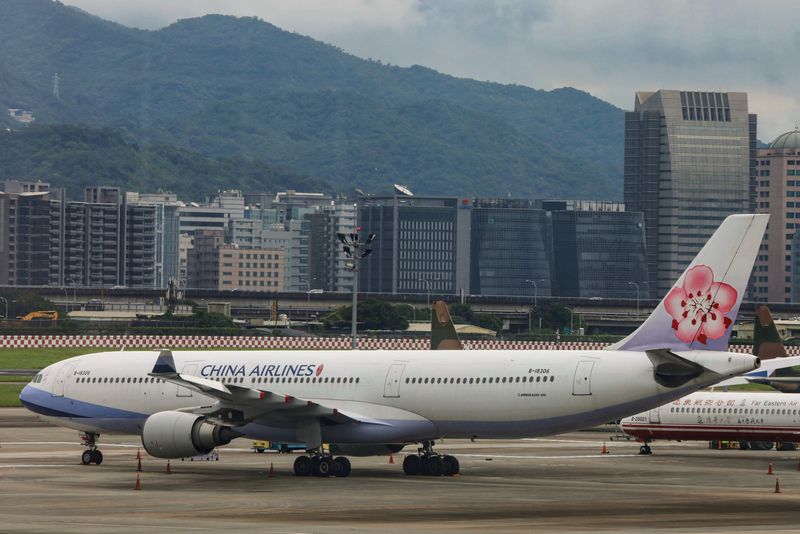By Jamie Freed and David Shepardson
(Reuters) -Taiwan's China Airlines Ltd said on Tuesday it would buy 16 Boeing (NYSE:BA) Co 787 widebody planes to replace its ageing fleet of Airbus A330s following a widely watched contest held against the backdrop of regional tensions.
The politically sensitive deal worth $4.6 billion at list prices was announced by the government-backed carrier weeks after a visit to Taipei by U.S. House of Representatives Speaker Nancy Pelosi angered Beijing and stoked Sino-U.S. trade tensions.
U.S. flagship planemaker Boeing had been widely expected to win the deal as talks by the government-backed carrier to renew its fleet coincided with attention to security partnerships amid what Taipei has called its worst tensions with China for 40 years.
Less certain, however, is how the deal may impact Boeing's relations with China, which typically accounts for about a quarter of its commercial sales, analysts said.
Boeing has been waiting for months for approval to resume 737 MAX deliveries to China despite the jet having been declared safe by Chinese authorities after a safety crisis.
While Beijing has in the past withdrawn or postponed high-profile business deals in response to U.S. or European arms sales to self-ruled Taiwan, which Beijing regards as a renegade province, civil airplane deals tend not to cause such a stir.
"Commercial business is more below the political radar," said a senior Western aerospace industry source.
But some analysts warn that trade with emblematic U.S. companies may become the new lightning rod for tensions following Pelosi's recent visit to Taiwan, as well as Chinese military exercises.
"Beijing has a long history of punishing Boeing and rewarding Airbus, and vice-versa, for perceived political sins. These can be committed by either the companies themselves, or the countries in which they’re based," said Isaac Stone Fish, founder of Strategy Risks, which studies corporate risk in China.
"For Boeing to sell planes to Taiwan, and just weeks after Speaker Pelosi’s trip to Taiwan drew a strong response from Beijing, definitely checks both those boxes," he added.
Boeing, which is usually quick to follow up airline order announcements with its own release, said hours later that it was pleased that China Airlines had selected the 787 and was working with the carrier to finalise the order.
Industry sources have said that the U.S. planemaker sought to distance itself from Pelosi's visit, refraining from using it as an opportunity to lobby for a U.S. deal, but would be wary of acting against its own deeper economic interests in China.
China tends to balance jet purchases between trans-Atlantic industrial powers Airbus and Boeing over time but has effectively been off the market for five years, with demand hampered first by trade tensions and then by the pandemic.
In July, Chinese state airlines announced a deal for 292 smaller narrowbody jets with Airbus, in what sources called a carefully timed announcement, months after the deal was agreed.
Boeing has long been seen as a contender to win a Chinese order for widebody jets like the 787 once trade tensions ease.
Boeing shares closed 1.9% lower on Tuesday.
Boeing Chief Executive Dave Calhoun said last month that 737 MAX deliveries to China remained blocked by COVID-19 and a "geopolitical overhang," in a reference to simmering trade tensions between the world's two biggest economies.
The order from Taiwan, however, is the latest sign of a long-awaited pickup in widebody demand and a boost for the U.S. planemaker weeks after it resumed deliveries of its premier long-haul model following a 15-month halt over production issues.
China Airlines said the 787s would allow it to phase out its fleet of 22 older A330s.

The carrier, one of the world's biggest freight airlines, cited the 787's cargo-carrying capacity as one of the reasons behind its selection in a contest that industry sources said pitted the 787 against the A330neo.
China Airlines, which has been profitable during much of the pandemic because of a shift to cargo services, is now gearing up for a rebound in passenger travel when Taiwan lifts quarantine rules for arrivals.